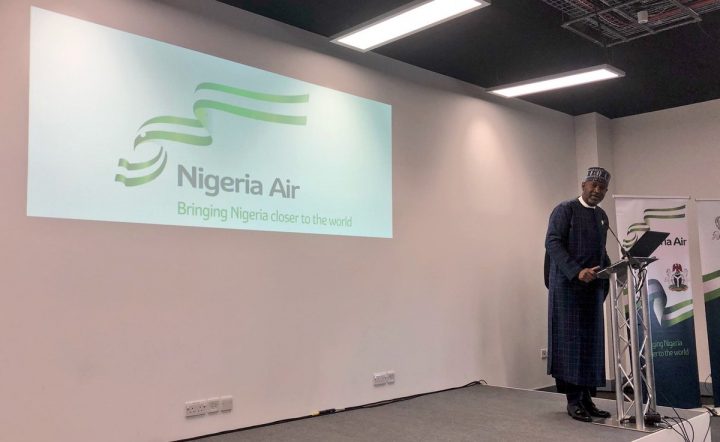- FG Unveils New National Carrier, Nigeria Air, Targets 81 Routes
The Federal Government on Wednesday unveiled the branding and livery for the new national carrier, Nigeria Air, and stated that the airline would be inaugurated at the end of this year.
According to a statement issued by the Ministry of Aviation in Abuja, the Minister of State for Aviation, Senator Hadi Sirika, unveiled the carrier at a press conference during the Farnborough Air Show in London.
Sirika was quoted as saying, “I am very pleased to tell you that we are finally on track to launching a new national flag carrier for our country, Nigeria Air. We are all fully committed to fulfilling the campaign promise made by our President, Muhammadu Buhari, in 2015. We are aiming to launch Nigeria Air by the end of this year.
“We obtained the Certificate of Compliance from the Nigerian Infrastructure Concession Regulatory Commission two weeks ago and can now go into the investor search. I am confident that we will have a well-run national flag carrier that is a global player, compliant with international safety standards and one which has the customer at its heart.
“We hope to establish an airline that communicates the essence of our beautiful country; an airline we can all be proud of.”
The ministry said the branding and naming of the new national carrier came after a social media campaign that was undertaken by the Ministry of Transportation (Aviation).
It said invited Nigerian youths were asked for their input in order to come up with a name for the new flag carrier, adding that the ministry’s Facebook page and website engaged over 400,000 people.
The ministry said extensive market research was carried out, which involved focus groups across the country, and over 100 interviews with aviation stakeholders and professionals, politicians as well as business owners.
It also stated that it was currently running an aviation road map that includes airport concession, aerotropolis, an aircraft Maintenance, Repair and Overhaul centre, agro allied terminals, the national carrier and an aircraft leasing company.
“The government will support the launch of the new flag carrier with viability gap funding in a public private partnership arrangement to deliver a national flag carrier guided by international standards,” the ministry added.
Sirika said the Federal Government had learnt a lot of lessons from the experience of the defunct Nigeria Airways, and was now determined not to repeat the mistakes that led to its demise.
Meanwhile, Sirika has stated that the Federal Government has selected 81 routes for the commencement of operation of Nigeria Air.
Speaking at the Farnborough Airshow in London following the unveiling of the new national carrier, the minister was quoted to have said that for a start, the airline would operate 40 domestic, regional and sub-regional and 41 international routes.
He added that the airline would operate on a Public-Private Partnership model, while investors and strategic partners would decide who would run it.
He said, “This airline is a business and not a social service. It is not intended to kill any airline in Nigeria but complement it and promote it. It must be done in the right way so that it will be here to stay.
“Government will not hold shares beyond five per cent at the topmost. This airline has the backing of the government. Government will come up with funding according to the business case that has been delivered to the government. We will engage the youth of Nigeria because we do believe in the ‘Not Too Young to Run’.
“We engaged them in the campaign to name this airline. We engaged 400,000 Nigerian youths to arrive at the name of the airline. All of their ideas were taken and digested and we came up with what is an average. The airline will take into cognizance the multicultural nature of the nation through its diversity. We want to use this airline to make a statement that yes, we can do it.”
The minister also said the government would fast-track the airline’s International Air Transport Association’s membership and safety audit.
An aviation expert, Group Capt. John Ojikutu (retd), however, stated that the Federal Government’s route plan was not properly thought out.
He said the routes were already saturated with the new airline’s competitors, adding that this might stifle its growth.
“Whoever is planning these routes for the new national carrier should go into records and see what happened along same routes between Nigeria Airways and KLM; Nigeria Airways and South Africa Airways and Nigeria and Virgin Atlantic. You cannot go into the same business with your competitor(s) as partners,” he said.

 Billionaire Watch4 weeks ago
Billionaire Watch4 weeks ago


 Naira4 weeks ago
Naira4 weeks ago


 Naira3 weeks ago
Naira3 weeks ago




 Naira3 weeks ago
Naira3 weeks ago




 Naira3 weeks ago
Naira3 weeks ago




 Naira2 weeks ago
Naira2 weeks ago
 Commodities3 weeks ago
Commodities3 weeks ago


 Sport Business4 weeks ago
Sport Business4 weeks ago




















